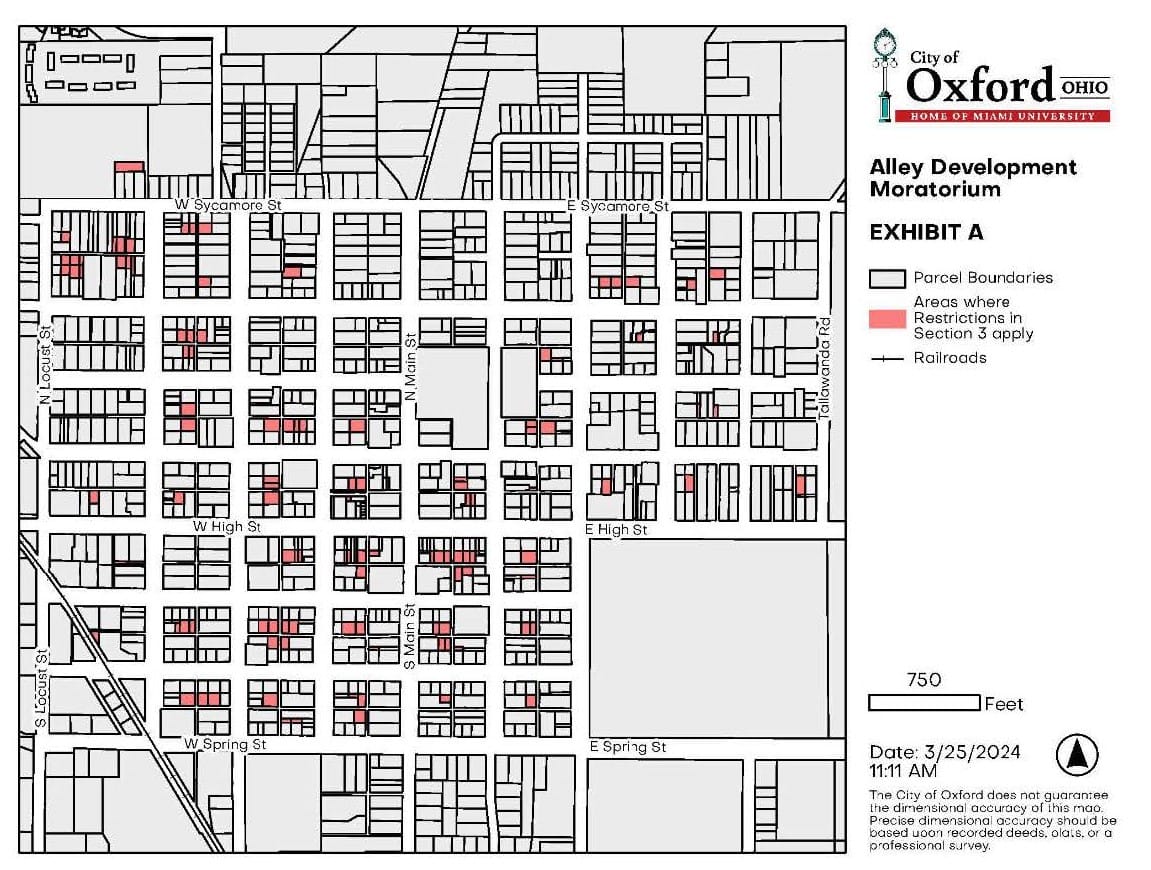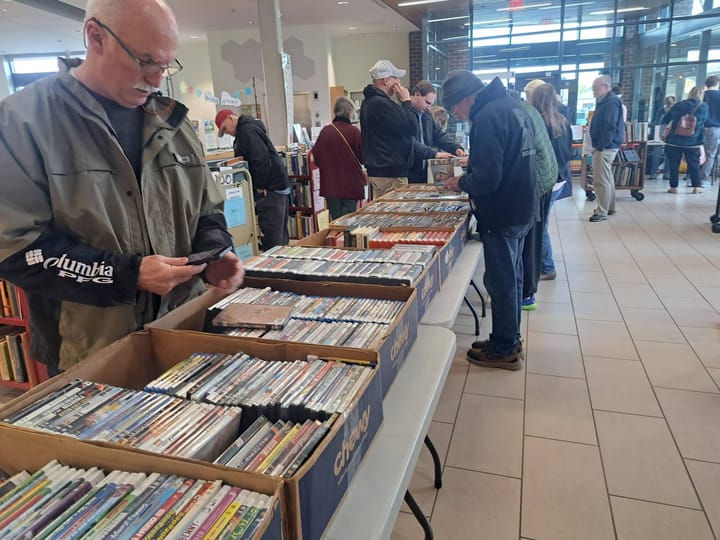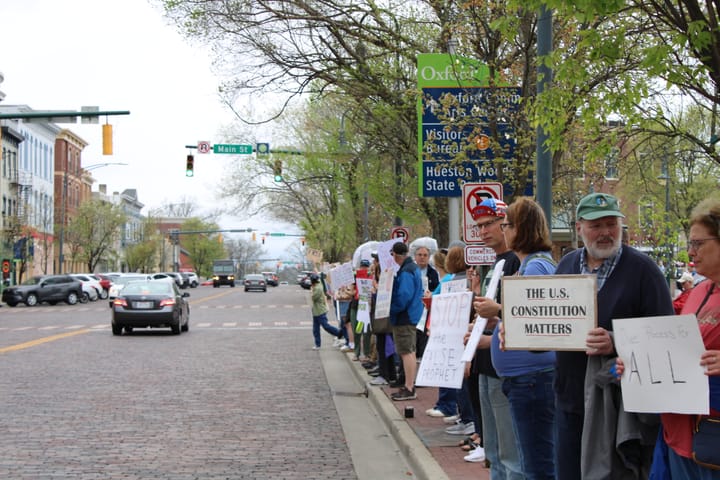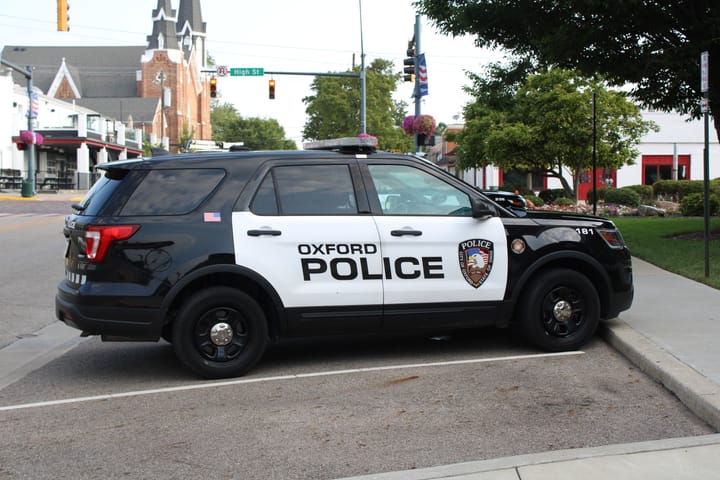Alley lot moratorium extended, city votes to let lease option agreement for solar project expire
Developers will have to wait until January for a moratorium on alley lot development to lift. After three years of waiting for progress on a solar project, City Council voted to let the current option to lease agreement expire.

Oxford has officially extended its moratorium on alley lot development to Jan. 16, 2025.
At an Oxford City Council meeting Sept. 17, Sam Perry, community development director, said the moratorium was originally proposed to last for one year when he brought it to council in April. However, council members opted to change the length to six months to limit the impact on developers, and it had been set to expire Oct. 2.
The moratorium was initially passed to address safety and zoning concerns related to the city’s 49 lots without street frontage.
During the Sept. 17 meeting, the council voted 5-2 to extend the moratorium, with council member Mike Smith and Mayor Bill Snavely voting against the extension.
Perry said the extension was necessary to give city staff time to create zoning code amendments for city council to vote on regarding alley lots. Two weeks ago, Perry shared a presentation during a work session highlighting issues such as infrastructure for stormwater management, trash and recycling services, and emergency vehicle access to alley lots.
Scott Webb, a local architect, said he didn't feel that the moratorium addressed any emergencies faced by the city. Many of the challenges identified at the work session, he said, were already addressed by the city's current zoning code.
"It just doesn't seem fair to the property owners" Webb said, "and I don't think there's a problem that warrants an emergency that we need to stop all development here. I just frankly don't see it."
Jim Clawson, a developer, said he didn't agree with the moratorium when it was passed but was willing to wait six months to see what happened. He agreed with Webb that it didn't feel like there was an emergency to make the moratorium necessary.
Snavely, who voted against the moratorium in April and against the extension, said it appeared to him that staff didn't make sufficient progress for five of the six months of the moratorium. Council member Amber Franklin voted for the extension but said council should be willing to let it go in January, even if there isn't as much progress as she and other council members want.
"If you look at the goals progress that the city is doing, the goals that city council set, they're doing a lot," Franklin said. "... I think that there's just limited resources, and this will allow staff to meet that goal hopefully, and if it can't happen in that time then we make a commitment that we won't push this [moratorium] any further."
New grant applications approved for park and trails
City Council unanimously approved two resolutions to allow city staff to accept grants to fund Uptown park and Oxford Area Trail System (OATS) improvements.
Both grants have already been secured by Ohio House Bill 2. According to staff reports, State Representative Sara Carruthers asked agencies within her district to submit capital project requests. When the state approved H.B. 2 in June, it included $175,000 for improvements to Martin Luther King Jr. Park and $800,000 to go toward a pedestrian railroad bridge for Phase Five of the OATS in the state budget.
To access the funds, the city is required to apply to and accept the grants from the Ohio Department of Natural Resources and the Ohio Office of Budget and Management.
The improvements in Martin Luther King Jr. Park will include renovating the fountain and adding a public restroom. The pedestrian railroad bridge, dubbed the "Oxford Student Safety Project," will be included in Phase Five of the OATS connecting Talawanda High School and Talawanda Middle School.
City votes down extension on lease option for solar project
In 2021, Oxford signed a three year option to lease agreement with BQ, now Clean Capital, to construct a solar project on the city landfill which closed in 1989. Council members voted 6-1 against extending that option beyond its Sept. 21 expiration date, citing frustrations with how long it's taken Clean Capital to break ground on the project.
City Manager Doug Elliott presented the resolution to extend the option to lease to Dec. 31 of this year. Clean Capital wanted to extend the option to see how Ohio legislators voted on House Bill 197, Elliott said, because that bill could create more funding options for solar projects.
Vice Mayor Chantel Raghu said she was unhappy about the project's shrinking size. When the city agreed to the option to lease in 2021, Elliott said the project could provide up to six megawatts of energy — enough to power 300 homes. Now, the current proposal from Clean Capital would provide just 1.75 megawatts.
"If they were to do the five megawatts, yeah, have until January," Raghu said. "But they're not, so we have an opportunity. We gave them three years. Nothing has happened."
Bracken agreed and said Clean Capital would still be able to lease the land even without the option. By not renewing it, he said the city would open itself up to better opportunities from other companies.
"I kind of feel bad that [Clean Capital] has been assumingly good faith — trying to move this forward and doing this permitting — to take away that potential because somebody else steps in," Bracken said. "But the truth is, we owe the obligation to the people of the city that if there is a better option, to not lock is in to that option [with Clean Capital] when we have better choices."
Clean Capital could still lease the land from the city even without the current agreement. Elliott cautioned that opting to move forward with a different company at this stage could set the city back to the beginning of the process and add years to the timeline of getting a solar project on city property, which has been a key part of the city's climate goals.




